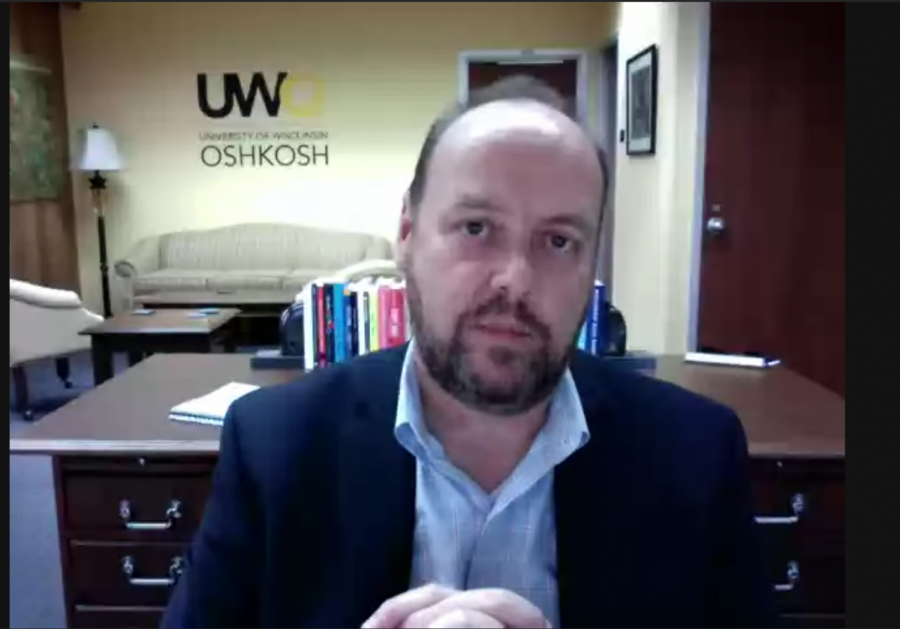Chancellor town hall addresses COVID, enrollment concerns
September 16, 2020
A week after classes began, UW Oshkosh Chancellor Andrew Leavitt held a town hall Wednesday morning to update staff, faculty and others about the university’s coronavirus situation and more.
“So far we’ve given 2,366 tests, of which 82 are positive,” Leavitt said at the town hall. However, the number of positive cases doubled by the time Tuesday’s numbers were posted, with 165 active cases reported at publication.
UWO’s COVID dashboard is updated about 11 a.m. each day, and only reflects antigen testing on the Oshkosh campus.
Tuesday’s on-campus testing numbers reflect 421 antigen tests, with 87 students, or 20.7%, and one staff member, or 8.3%, testing positive. It’s the first time a UWO staff member has tested positive for the coronavirus this school year.
Individuals who test positive for coronavirus are instructed to take a polymerase chain reaction (PCR) test to verify their results as soon as possible, but the results of these tests are not reflected in the UWO COVID dashboard statistics to avoid double counting.
“Students are wearing their masks,” Leavitt said. “It just simply isn’t the problem we thought it would be. I think our students — and our faculty and staff, everybody — is cooperating and following the protocols.”
Leavitt said the University Police has not detected the large house parties that are typical of a “normal” year.
“That’s not to say there aren’t gatherings, but they tend to be much smaller and outside,” he said.
Leavitt said the university’s goal remains unchanged: “We want to be able to finish the semester in the formats we currently have.”
“No one is testing like we are,” he said. “We’re asking for more antigen tests, and we’re getting them.”
But the testing center takes a lot of people to run. Some of this need has been filled by reassigning staff to roles in the Albee testing center, as well as the help of Prevea employees.
However, Leavitt said the university needs still more help in the testing center, mostly due to the vast amount of clerical work necessitated by a large-scale testing operation.
“This testing center is going to help us stay face-to-face as a university,” he said, asking staff to consider a reassignment to the testing center. “If we don’t get the kind of support and resources and help we need for the testing center, then none of the rest of it matters.”
Enrollment
UWO’s slowly dropping enrollment has been a major cause of concern to the university’s finances for years. The COVID-19 pandemic hasn’t helped, as has also been seen by other universities in the UW System and throughout the country.
“We’re going to come in most likely somewhere between 6 and 7 percent off of the total enrollment of the institution,” Leavitt said of the university’s 10-day census. “[It’s] a lot less than what we had anticipated. That, coupled with some growing uncertainty, if you will — in a good way — with what’s happening state-side with the subsidy.”
The state may be in a position where they don’t want to cut state agencies deeply in this current budget, Leavitt said.
“As I said in my opening-day address, we were very conservative in how we budgeted for this year, assuming a larger student drop, and a GPR (general purpose revenue) reduction as well,” Leavitt said. “If things work out — and as I pledged to you the other day in my speech — our first priority will be to move everybody off of furlough. The moment we believe we can prudently move off furlough, we will. That may be mid-semester, it may be the end of semester. If things change radically in the wrong direction, we may have furloughs again in spring. You can get a sense of the uncertainty we’re facing on a day-to-day basis on this.”
Leavitt said UWO was able to finish last semester strong and be well-positioned for this year due to the sacrifices and furloughs that staff have taken.
“We move forward,” he said.














